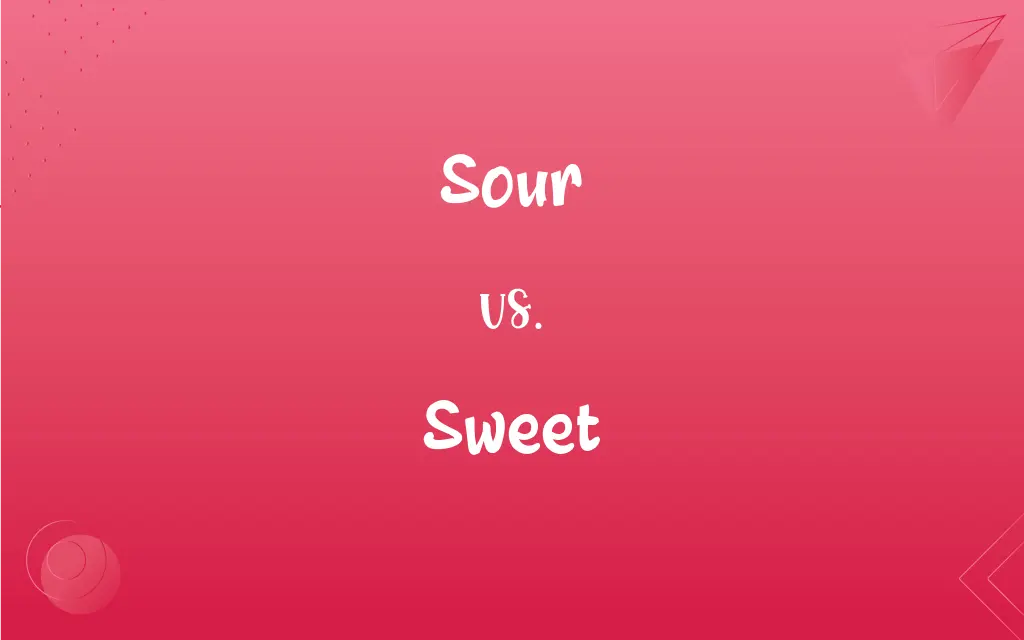Sour vs. Sweet: What's the Difference?
Edited by Aimie Carlson || By Harlon Moss || Updated on November 19, 2023
"Sour" describes a taste sensation typically associated with acidity, like lemons; "sweet" refers to the taste sensation of sugar or honey.

Key Differences
Sour is characterized by an acidic, sharp taste, often associated with citrus fruits like lemons. Sweet, in contrast, is known for its pleasurable, sugary flavor, as in cakes and candies.
Sour flavors can stimulate salivation and often have a tart, pungent taste, such as vinegar. Sweetness is generally pleasing and is associated with desserts and ripe fruits.
The taste of sour is often linked to unripe or fermented foods, giving a biting, tangy sensation. Sweet tastes are usually comforting and are often used to balance other flavors in cooking.
Sour can also describe a person's mood as being bad-tempered or resentful. Sweet, alternatively, describes a kind, pleasant, or affectionate disposition.
Sour refers to an acidic and often sharp taste, while sweet denotes a sugary, pleasant flavor.
ADVERTISEMENT
Comparison Chart
Basic Taste
Acidic and tart
Sugary and pleasurable
Food Examples
Lemons, vinegar, sour cream
Honey, chocolate, ripe fruits
Sensory Effect
Stimulates salivation, can be pungent
Generally pleasing, often comforting
Common Associations
Unripe fruits, fermentation
Desserts, confectionery
Figurative Use
Describes a resentful or bad-tempered mood
Indicates kindness, pleasantness
ADVERTISEMENT
Sour and Sweet Definitions
Sour
Having an acidic, tart taste.
The sour lemons made her pucker.
Sweet
Kind, pleasant, or amiable.
Her sweet disposition was well-known.
Sour
Resentful, bad-tempered.
He was sour after losing the game.
Sweet
Having the pleasant taste of sugar.
The sweet cake was a delight.
Sour
Sharp or biting in manner.
Her sour comments were off-putting.
Sweet
Pleasing to the senses.
She wore a sweet perfume.
Sour
Made acidic or spoiled.
The milk has gone sour.
Sweet
Sentimentally charming or endearing.
The movie had a sweet ending.
Sour
Displeasing or unfavorable.
The deal left a sour taste in his mouth.
Sweet
Free from unpleasantness.
It was a sweet victory for the team.
Sour
Having a taste characteristic of that produced by acids; sharp, tart, or tangy.
Sweet
Having the taste of sugar or a substance containing or resembling sugar, as honey or saccharin.
Sour
Made acid or rancid by fermentation.
Sweet
Containing or derived from sugar.
FAQs
What foods are typically sour?
Citrus fruits, fermented products like yogurt.
Can "sweet" refer to non-food items?
Yes, like sweet music or a sweet gesture.
Can "sour" describe a person's attitude?
Yes, it can mean resentful or grumpy.
Is "sweet" used only for taste?
No, it also describes pleasant or kind personalities.
How is "sour" used in music?
To describe a discordant or off-key sound.
Is "sweet" always positive?
Generally, but it can be overly sentimental.
Is "sour" a basic taste?
Yes, it's one of the five basic tastes.
How does "sour" interact with other flavors?
It can enhance or contrast other tastes.
Can "sweet" indicate naivety?
Sometimes, as in being too trusting.
Does "sweet" have health implications?
Yes, especially in the context of sugar intake.
Is "sour" used in expressions?
Yes, like "sour grapes."
Does "sweet" relate to sound?
Yes, as in a sweet melody.
Can "sweet" be too much?
Yes, as in excessively sweet desserts.
Does "sour" imply spoilage?
Often, especially with dairy or food.
Can "sour" affect mood?
Yes, as in "souring" one's mood.
Can "sweet" be used in literature?
Yes, to describe pleasant scenes or characters.
Does "sour" have a cultural significance?
Yes, in some cuisines and expressions.
Is "sweet" a desirable taste in all cultures?
Mostly, though preferences can vary.
Is "sweet" used in romantic contexts?
Yes, often to describe affectionate acts.
Can "sour" describe a situation?
Yes, as in a relationship turning sour.
About Author
Written by
Harlon MossHarlon is a seasoned quality moderator and accomplished content writer for Difference Wiki. An alumnus of the prestigious University of California, he earned his degree in Computer Science. Leveraging his academic background, Harlon brings a meticulous and informed perspective to his work, ensuring content accuracy and excellence.
Edited by
Aimie CarlsonAimie Carlson, holding a master's degree in English literature, is a fervent English language enthusiast. She lends her writing talents to Difference Wiki, a prominent website that specializes in comparisons, offering readers insightful analyses that both captivate and inform.































































